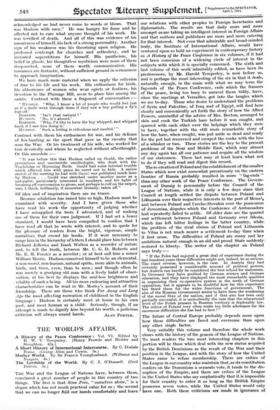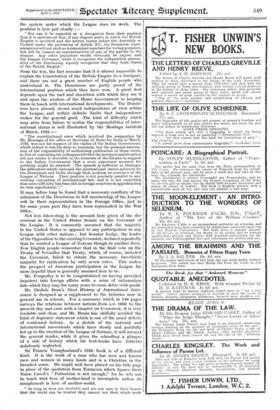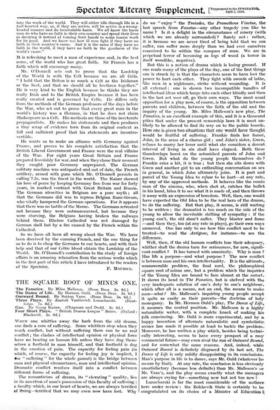THE WORLD'S AFFAIRS.
A Short History of International Intercourse. By C. Deslisle Burns. (George Allen and Unwin. 5s.) The Lordship of the World. By C. J. O'Donnell. (Cecil Palmer. 5s.)
Tan War and the League of Nations have, between them, convinced a great number of people in this country of two things. The first is that Sinn Fein, " ourselves alone," is a slogan which has not much practical value for us ; the second that we can no longer fold our hands comfortably and leave our relations with other peoples to Foreign Secretaries and diplomatists. The results are that daily more and more amongst us are taking an intelligent interest in Foreign Affairs and that authors and publishers are more and more catering for that interest. Not even that admirable and broad-minded body, the Institute of International Affairs, would have ventured upon so bold an experiment in contemporary history as A History of the Peace Conference in six volumes, if it had not been conscious of a widening circle of interest in the subjects with which it is specially concerned. The sixth and last volume of this work admirably edited, as have been its predecessors; by Mr. Harold Temperley, is now before us, and is perhaps the most interesting of the six in that it deals, naturally enough, in the main with what we may term the fag-ends of the Peace Conference, ends which the framers of the peace, being too busy to unravel them tidily, have, since the meetings at Versailles, got into the tangles which we see to-day. Those who desire to understand the problems of Syria and Palestine, of Iraq and of Egypt, will find here clearly and conveniently set forth the story of how the Allied Powers, unmindful of the advice of Mrs. Beeton, arranged to skin and cook the Turkish hare before it was caught, and sparred with each other over the helpings which they were to have, together with the still more remarkable story of how the hare, when caught, was put aside as dead and ready for the pot but recovered and escaped the cooks with the loss of a whisker or two. These stories are the key to the present problems of the Near and Middle East, which may almost any day again tax all our patience and require all the wisdom of our statesmen. These last may at least learn what not to do if they will read and digest this record.
There-creation of Poland and the establishment of the smaller States which now exist somewhat precariously on the eastern frontier of Russia probably resulted in more " fag-ends " than any other work of the Peace Conference. The Govern- ment of Danzig is perennially before the Council of the League of Nations, while it is only a few days since that Council at length settled the dispute between Poland and Lithuania over their respective interests in the port of Memel, and between Poland and Czecho-Slovakia over the possession of Jaworzina, disputes which the Conference of Ambassadors had repeatedly failed to settle. Of older date are the quarrel and settlement between Poland and Germany over Silesia, which has left bitter feelings in the latter country, while , the problem of the rival claims of Poland and Lithuania to Vilna is not much nearer a settlement to-day than when it first arose. The difficulties of Poland are many and her ambitions natural enough in an old and proud State suddenly. restored to liberty. The writer of the chapter on Poland says truly :-
" If the Poles had enjoyed a great deal of experience during the last hundred years these difficulties might not, indeed, be so serious. The exact reverse, however, is the case. In Austria they had certainly possessed a considerable amount of political powers, but Austria can hardly be considered the best school for statesmen. In Germany they have profited by German science and German education, and they have displayed the most remarkable qualities in organizing their co-operative system in the teeth of German opposition, but it appears to be doubtful how far this experience has fitted them for the wider functions of government. The aim of the Russian Government seems to have been the weakening of the moral fibre of the nation, and if that aim has been only partially successful, it is undoubtedly the case that the educational level of the Polish peasant in Russian territory is deplorably low. The critics of Poland very often make too little allowance for the enormous difficulties she has had to face ! "
The future of Central Europe probably depends more upon how these difficulties are faced and overcome than upon any other single factor.
Very suitably this volume and therefore the whole work closes with the history of the genesis of the League of Nations. To most readers the two most interesting chapters in this portion will be those which deal with the new status acquired by the British Dominions as the result of the War and their position in the League, and with the story of how the United States came to refuse membership. There are critics of the League in our country who maintain that, as its constitution confers on the Dominions a separate vote, it tends to the dis- ruption of the Empire, and there are critics of the League in the United States who say emphatically that it is impossible for their country to enter it so long as the British Empire possesses seven votes, while the United States would only have one. Both these criticisms are made in ignorance of . the system under which the League .does its work. The . position is here put clearly :—
" Nor can it be regarded as a derogation from their position that it is understood that, if any dispute arises in which the British
• Empire is involved and the matter comes before the Assembly or Council under the provisions of Article XV., the Dominion repre- sentatives will not rank as independent members for voting purposes, , but will be treated as representatives of one of the parties to the dispute. Any other procedure would obviously be unjust, and the League Covenant, while it recognizes the independent person- ality of the Dominions, equally recognizes that they form States of the British Empire."
None the less, the fact remains that it is almost impossible to explain the Constitution of the British Empire to a foreigner, and there are not a great number of English people who understand it. The Dominions are justly proud of the international position which they have won. A great deal depends upon the tact and discretion with which they use it and upon the wisdom of the Home Government in keeping them in touch with international developments. The Domin- ions have already shown much independence of view within the League, and within definite limits that independence makes for the general good. The kind of difficulty which may arise from failure to realize the responsibilities of inter- national status is well illustrated by the Montagu incident of March, 1922 :—
" The constitutional error which involved the resignation by Mr. Montagu of his office as Secretary of State for India in March, 1922, was not his support of the claims of the Indian Government, which indeed it was lus duty to maintain, but the personal assump- tion of the responsibility of authorizing publication of those views, in lieu of, consulting his colleagues whether the international situation did not render it desirable in the interests of the Empire to suggest to the Indian Government that a more opportune moment for publicity might be awaited. The episode is sufficient to illustrate the difficulties which surround the international status achieved by the Dominions and India through their position as members of the League of -Nations. Their position is not precisely parallel to any existing conception of international law, and it is not surprising that some difficulty has been felt in foreign countries in apprehending its true signification 1"
It may before long be found that a necessary corollary of the admission of the Dominions to full membership of the League will be their representation in the Foreign Office, just as for some years past they have been represented in the War Office.
Not less interesting is the account here given of the dis- cussions in the United States Senate on the Covenant of the League. It is commonly assumed that the majority in the United States is opposed to any participation in any League with other nations ; but Senator Lodge, the leader of the Opposition to the existing Covenant, declared repeatedly . that he wanted a League of Nations though in another form, . Few English people remember that in the final vote on the Treaty of Versailles that Treaty, which, of course, included the Covenant, failed to obtain the necessary two-thirds majority for ratification by only seven votes. This makes the prospect of American participation in the League far more hopeful than is generally assumed here to be.
Mr. Temperley is to be congratulated on having provided inquirers into foreign affairs with a mine of information into which they may for many years to come delve with profit.
Mr. Deslisle Burn's Short History of International Inter- course is designed as a supplement to the histories now in general use in schools. For a summary which in 140 pages surveys the relations between nations from A.D. 1000 to the present day and ends with a chapter on to-morrow, it is very readable and clear, and Mr. Burns has skilfully avoided the kind of dogmatic statement which is one of the usual defects of condensed history. As a sketch of the national and international movements which have slowly and painfully led up to the creation of the League of Nations, it will interest the general reader, while it gives the schoolboy a glimpse . of a side of history which his text-books have hitherto sedulously neglected.
Sir Francis Vounghusband's little book is of a different kind. It is the work of a man who has seen and known men and women in many lands and is a Christian in the broadest sense. He might well have placed on his title page in place of the quotation from Tennyson which figures there Nurse Cavell's " Patriotism is not enough," for he sets out to teach that love of mother-land is incomplete unless its Complement is love of mother-world.
" As long as men are doubtful and are not sure in their hearts that the world can be trusted they cannot nut their whole souls
into the work of the world. They will either idle through life in a half-hearted way, or, if they are active, will be active in a wrong- headed manner and do incalculable harm. We all know the harm men do who have no faith in their own country and spend their lives in decrying it instead of turning their hands to some honest work for its good. And we know too how ill men fight if they have no faith in their country's cause. And it is the same if they have no faith in the world, if they have no faith in the goodness of the world's cause."
It is refreshing to meet a man of experience and, in the best sense, of the world who has great faith. Sir Francis has a faith which will encourage many.
Mr. O'Donnell sets out to prove that the Lordship of the World is with the Celt because we are all Celts. " I hold that the Briton is as much a Celt as the Irishman or the Scot, and that we should all be brethren together." He is very kind to the English because he thinks they are really Irish and to the British Empire because it has been really created and is governed by Celts. He differs only from the methods of the German professors of the days before the War, who set out to prove that every great man in the world's history was a German, in that he does not claim Shakespeare as a Celt. His methods are those of the inveterate propagandists. He makes his statements and then produces a tiny scrap of evidence torn from its original context as full and sufficient proof that his statements are incontro- vertible.
He wants us to make an alliance with Germany against France, and proves to his complete satisfaction that the British Liberal Government and France were the real villains of the War. For eight years Great Britain and France prepared feverishly for war, and when they chose their moment they caught poor Germany unprepared. The German military machine was antiquated and out of date, the French artillery, armed with guns which Mr. O'Donnell persists in calling 7.5s, was the finest in the world. The Kaiser showed his love of peace by keeping Germany free from war for forty years, in marked contrast with Great Britain and Russia. The German atrocities in Belgium are a pure myth ; all that the Germans did was to repress Belgian franc-tireurs, who vitally hampered the German operations. For it appears that there was no battle of the Marne. The Germans retreated not because they were outmanoeuvred, but because they were starving, the Belgians having broken the railways behind them. Rheims Cathedral was not damaged by German shell but by a fire caused by the French within the Cathedral.
So we have all been all wrong about the War. We have been deceived by the cunning French, and the one thing for us to do is to clasp the Germans to our hearts, and with their help and that of our Celtic blood obtain the Lordship of the World. Mr. O'Donnell's contribution to the study of foreign affairs is an amusing relaxation from the serious works which in the first part of this article I have introduced to the readers of the Spectator. F. MAtrincE.




























































 Previous page
Previous page